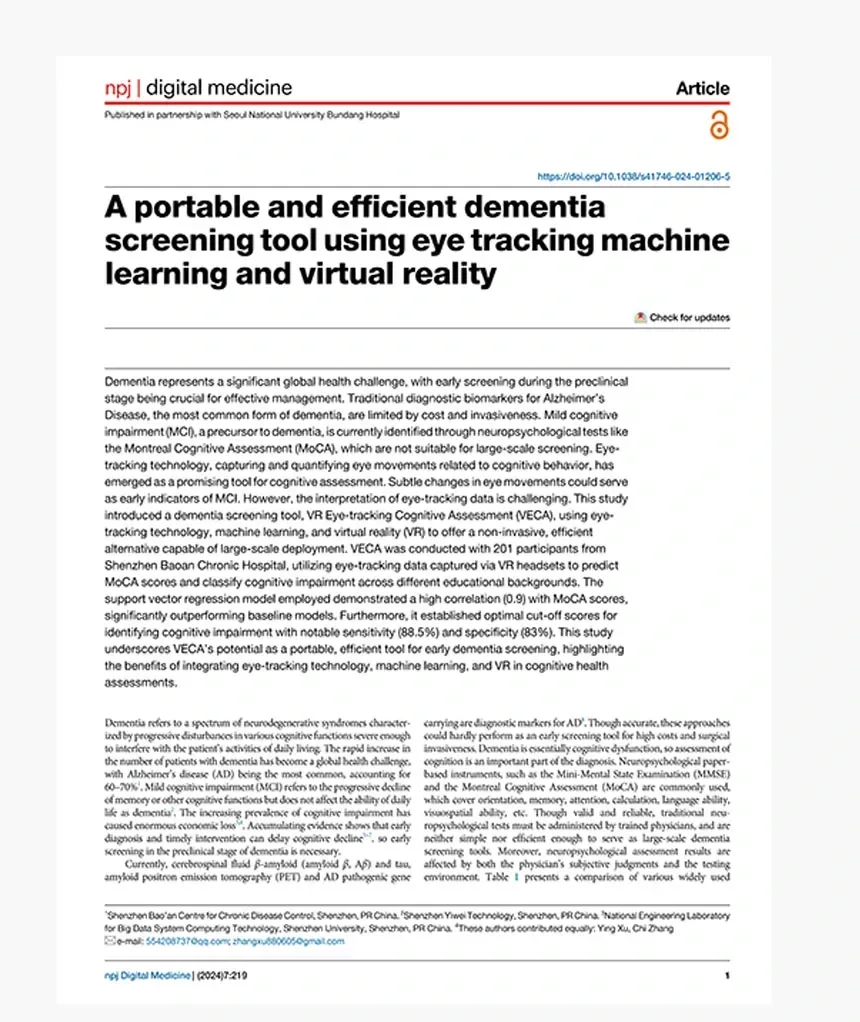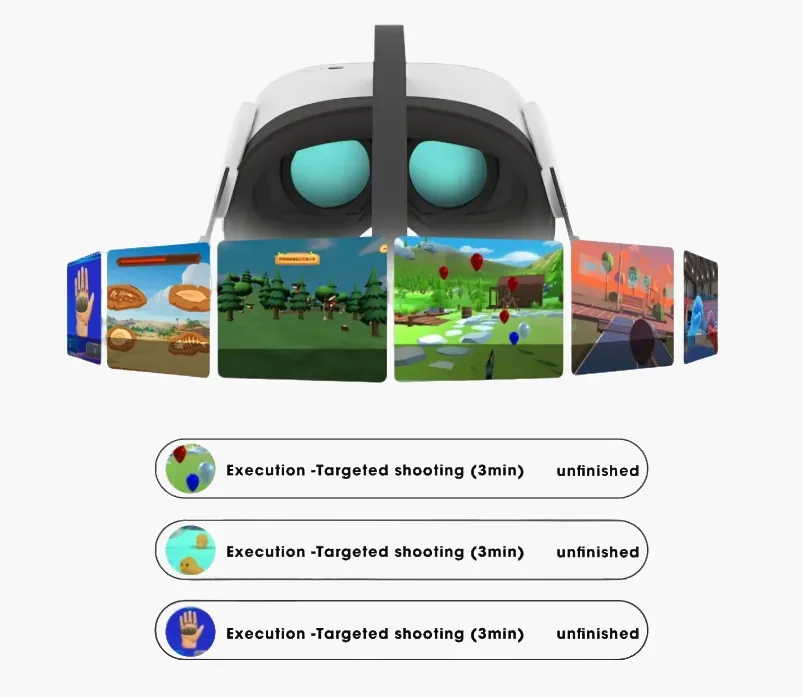
Innovative inquiries shows that computer-generated reality approach can markedly improve the states of patients dealing with brain function deterioration. By transferring them to serene locations, VR offers a special platform for mind energizing, affective stabilization, and community engagement. Several investigations have established that VR therapy can reduce turmoil, nervousness, and gloom in dementia subjects while also elevating their recall, concentration, and dialogue proficiency.
- VR enables patients with dementia to revisit dear memories through responsive representations.
- In addition, it can supply a protected and supportive space for people connection, cultivating a realization of relationship and fitting in.
- Authorities conclude that VR therapy has the prospect to overhaul dementia support by giving new and creative approaches to address the elaborate barriers faced by clients struggling against this ailment.
Advanced Digital Care for Cognitive Support in Alzheimer's
Innovative computerized strategies are indicating success in the domain of brain function boosting for participants experiencing Alzheimer's ailment. These tools capitalize on technical resources to strengthen brain capacity and theoretically slow down the spread of the malady. Interactive drills, personalized guidance, and psychological training are some examples of methods being researched in this flourishing territory. While studies are underway, digital therapeutics furnish a substitute avenue for enhancing the conditions of those suffering from neurodegenerative Alzheimer type.Novel VR Techniques for Alzheimer's Intervention
Touching users managing Alzheimer's dementia, the ongoing degradation of recall and thinking skills can drastically impact their skill to associate with the environmental sphere. This impairing malady often elicits in isolation, agitation, and a impaired sense of self. Current developments in virtual reality technology present a revolutionary option to tackle these concerns by creating immersive scenarios that can encourage the brain and invigorate cognitive function.
Simulated reality settings developed specifically for Alzheimer's sufferers can send them in familiar spots, such as their juvenile habitat or a preferred green space, recalling positive memories and alleviating anxiety. Through interactive exertions, these virtual domains can also engage cognitive abilities like memory, mindfulness, and critical thinking.
The positive effects of virtual reality in Alzheimer's support are manifold. Early tests have revealed hopeful results, with clients exhibiting improvements in cognitive capacity, mood, and overall quality of life. As this technology expands, it holds the key to innovating the way we approach Alzheimer's disease, offering a new pathway for intervention and motivation.
Computer-Aided Reminiscence for Alzheimer's Victims
Reminiscence therapy is an acknowledged technique used to augment cognitive function and psychosocial health in individuals with Alzheimer's disease. This time-honored form of therapy involves prompting patients to retrieve past experiences, often through conversation. However, a radical approach is emerging: VR-mediated reminiscence therapy.
This immersive tool utilizes virtual reality headsets to place patients in authentic environments that recall memories from their past. By experiencing these replicated atmospheres, individuals with Alzheimer's can participate with their past in a impactful way.
VR's Promise for Dementia Care: Enhancing Memory and Cognition
Virtual reality (VR) is emerging as a prospective instrument in the fight against dementia, presenting state-of-the-art ways to engage memory and cognition. By forming immersive simulations, VR can empower individuals with dementia recover memories, interact in meaningful activities, and elevate cognitive abilities. Studies have proved that VR interventions can cause significant improvements in memory recall, attention, and locational awareness. Moreover, VR provides a risk-free and motivating space for individuals with dementia to share, reducing feelings of isolation and worry.
- Also, VR can be tailored to individual needs and preferences, supporting broader levels of interaction.
- In spite of the capabilities of VR, extended research is needed to fully understand its long-term performance in dementia care.
Reviving Recollections, Restoring Bonds: VR's Influence on Alzheimer's Social Interaction
Computer-generated reality is emerging as a advanced resource in the sphere of dementia care. By developing immersive and interactive realities, VR has the capability to encourage memories, foster social interaction, and augment the overall quality of life for participants experiencing Alzheimer's. Especially an important remarkable aspects of VR is its ability to shift users to cherished settings and events from their past. Whether it's a walk through a childhood home or a simulation of a beloved holiday, these virtual explorations can stimulate happy memories and deepen cognitive skills. Furthermore, VR can support social interaction by bringing together individuals with others who share similar backgrounds. This can be particularly valuable for people with Alzheimer's who may digital therapy have trouble with traditional social participation. By offering a safe and captivating virtual space, VR can reduce feelings of isolation and loneliness, which are common among individuals struggling with Alzheimer's. Overall, VR holds immense power for improving the lives of persons with Alzheimer's by reviving memories, reinforcing connections, and boosting their quality of life. As technology keeps on develop, we can expect even more imaginative applications of VR in the field of dementia care.Leveraging Cognitive Training: Applying VR to Alleviate Alzheimer's Symptoms
Virtual reality is rapidly emerging as a cutting-edge tool in the realm of cognitive training, particularly for users struggling with Alzheimer's disease. By immersing patients in interactive and engaging virtual environments, VR-based interventions can energize cognitive functions such as memory, attention, and problem-solving. These games often incorporate elements of storytelling, exploration, and social interaction, making the training process increasingly entertaining. Studies have shown that VR-based cognitive training can lead to substantial improvements in cognitive performance, hypothetically delaying the progression of Alzheimer's symptoms. Moreover, VR provides a safe and controlled environment for patients to practice new skills and reinforce their confidence.
- Game elements in VR training can make it significantly captivating and exciting for individuals with cognitive impairments.
- VR simulations can offer lifelike scenarios that provoke and motivate cognitive functions.
- Personalized VR experiences can cater to custom requirements and techniques.
Virtual Reality as a Renewed Opportunity for Dementia Patients
Immersive virtual reality offer a unique and promising avenue for people affected by dementia. These platforms can simulate familiar environments, allowing those affected by cognitive decline to relive cherished memories and enhance a sense of ease. By alleviating the challenges of dementia, VR spaces have the power to enhance quality of life for both people and their assistants.
- Studies indicate that VR strategies can considerably impact cognitive function, neural well-being, and even locomotor abilities in individuals with dementia.
- Moreover, VR offers a safe and supportive environment for discovery, reducing the risk of damage.
- In addition, VR can support social communications by allowing individuals with dementia to socialize in augmented activities with others.
Leveraging VR for Timely Alzheimer's Diagnosis and Care
Alzheimer disorder emerges a complicated problem, often going undetected in its early stages. However, virtual reality (VR) is developing as a revolutionary tool for precocious diagnosis. Through immersive virtual worlds, VR can appraise cognitive skills in ways that traditional methods are limited to. This possibility allows for timely intervention strategies, potentially delaying disease progression and upgrading the quality of life for clients with Alzheimer's.
- VR cognitive tests measure recall, alertness, and positional skills in safe and regulated spaces.
- Bespoke VR applications facilitate interactive mental activity for patients.
- Virtual environments can provide a supportive and engaging platform for individuals with Alzheimer's to socialize.
VR as a Medium for Dementia Engagement and Social Participation
{In the realm of dementia care, innovative technologies are emerging to augment the lives of subjects facing dementia challenges. Virtual reality (VR) is one such tool that holds immense possibility for closing social and communicative divides common in dementia patients. By offering absorbing computer-generated environments, VR can animate cognitive function, reduce behavioral issues, and ultimately improve the overall well-being of participants handling dementia.
VR experiences customized for dementia assistance can range from reflection therapy sessions that immerse patients in recognizable historic moments, to interactive games that promote social interaction and cognitive training. Furthermore, VR has the capacity to connect dementia patients with family and friends, regardless of physical distance, fostering a sense of togetherness.
- VR can enable in reducing agitation and anxiety by providing a calming and absorbing environment.
- Clinical trials have shown that VR interventions can lead to improvements in cognitive function, mood, and social interaction in subjects coping with dementia.
- As technology continues to evolve, we can expect even more innovative and {effective|beneficial|helpful|powerful|impactful|successful|productive|efficient
